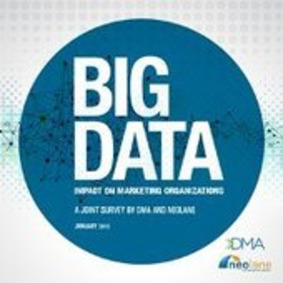 Your new post is loading...

|
Scooped by
Marteq
|
Excerpt...
I've found, in my direct interactions with firms, that leaders know the real value of big data is lower cost and greater agility. When I interviewed 11 firms with production-class big data implementations, all of them told me the same thing — they got into big data when they couldn't figure out how to accomplish what their business wanted in an affordable way with their existing technology. Further, none of these firms started with external social, mobile, or other exotic forms of data. They began with data they had and understood but could not afford to capture and analyze at scale. The point is that high-performance firms seem to be on to something in big data that many miss. It's not about the hype, it's about the best solution to meet needs most effectively. They are opportunistically finding ways to exploit new technology and analytic techniques to get past limitations, lower cost, and create greater agility; and they are focusing on the data they have while looking opportunistically toward the potential for adding newer internal and external data sets into the mix. While all this works out, the best advice I can give firms is to dump their isolated, IT-led "big data strategy" aspiration, and embrace the potential that the big data concept implies. Rather than separate big data or even data strategies, I encourage firms to ensure that a plan for data is a part of their business strategy, and this plan must account for the new reality — we have the tools and techniques to enable agility while we affordably operate a larger scale. At the end of the day, that's what big data is all about.

|
Scooped by
Marteq
|
“How should we get started?” I’m asked that question all the time. It’s clear that by now, most marketers recognize the link between data-driven marketing and business value.
Condensed...
When I say, “It’s time to get strategic,” I mean you need to develop each one of these five: 1. Customer interaction strategy. Map and understand the buyer journey, from first contact all the way through purchase and aftermarket relationships. Then, identify the changes that need to occur in your company across organizations, systems and data to transform and deliver on your customer engagement plan. Remember: Your goal is to create a consistent, omnichannel customer-centric journey.
2. Analytics strategy. There are three main categories of analytics: business analytics, predictive analytics and prescriptive analytics. Because data and technology will fuel analytics, you need to determine where you are currently and what type of analytics you need to compete and better position your organization in this age of digital disruption.
3. Data strategy. Given the traditional silos of information across the enterprise and the fact that data-driven marketing requires credible data, the development of an enterprise-wide data strategy is absolutely critical. In order for your data strategy to be actionable, it needs to permeate the enterprise, and it needs to be driven as a partnership between IT, marketing and other key business functions.
4. Organizational strategy Since big data transcends departmental walls and challenges conventional approaches, it is disrupting traditional organizational structures and silos. As a result, the C-suite needs to work together to revisit organizational models, evaluate current structures and design new approaches to maximize revenue growth in this new world.
5. Technology strategy. Successful organizations not only nurture strategic partnerships between the CMO and CIO, but also marry business and technology strategy. Then, when debates or roadblocks emerge in these companies, the CIO and CMO can use the broader vision to continue to drive change.

|
Scooped by
Marteq
|
Below, we take a look at several pressing Big Data questions that can result in valuable insights about your business and customers:
1. What Do Our Customers Want? The fact that companies should ask what their customers want is not exactly revolutionary. But, the idea that your data can predict whether or not your customers will like something based on a set of data points is pretty interesting, if not entirely revolutionary.
2. When Do Customers Want What They Want?: As marketers know, the age-old adage “there’s no time like the present” is not always true. Sometimes, the present is the exact wrong time for something.
3. Why Are Our Customers Leaving Us? No business or organization likes to be in the position of seeing customers walking out the proverbial door. Even worse though is not understanding why a customer is leaving. If your customers are leaving in droves, wouldn’t you do anything you could to stop them? Of course you would. Use your Big Data to tell you a story about why your customers are jumping ship and then make an end-run to keep them.
4. How Can We Take Control of Things We Have No Control Over?: In business, we can control lots of things, but lots of other things evade even our most herculean efforts to master them. Like weather. And natural disasters. And wars. So, maybe we will never be able to make it rain when we want it to or to snow (naturally) on the day ski season starts, but we can learn about how those Uncontrollables impact our business so that we can better plan. Use Big Data to learn from those vexing things that you can’t put a stop to. Sure, maybe you can’t make it snow as much as you want, but you can use data from the last time it didn’t snow much to understand how many chair lifts you need to have open this time.

|
Scooped by
Marteq
|
Quant skills are necessary but not sufficient.
Condensed...
1. Data Hygienists make sure that data coming into the system is clean and accurate, and stays that way over the entire data lifecycle. 2. Data Explorers sift through mountains of data to discover the data you actually need. That can be a significant task because so much data out there was never intended for analytic use and, therefore, is not stored or organized in a way that's easy to access. 3. Business Solution Architects put the discovered data together and organize it so that it's ready to analyze. They structure the data to ensure it can be usefully queried in appropriate timeframes by all users. 4. Data Scientists take this organized data and create sophisticated analytics models that, for example, help predict customer behavior and allow advanced customer segmentation and pricing optimization. They ensure each model is updated frequently so it remains relevant for longer. 5. Campaign Experts turn the models into results. They have a thorough knowledge of the technical systems that deliver specific marketing campaigns, such as which customer should get what message when. They use what they learn from the models to prioritize channels and sequence the campaigns — for example, based on analysis of an identified segment's historical behavior it will be most effective to first send an email then follow it up 48 hours later with a direct mail.

|
Scooped by
Marteq
|
"The CMO will spend more on IT than the CIO by 2017, says Gartner. Yet, this marriage of different functions creates a unique tension..."
Digest...
Marketers don’t get code, and coders don’t get marketing. It’s the new Men are from Mars, Women are from Venus.Just consider the awkward conversations between SEOs and traditional branders. That’s inside the marketing department. Strategists need to understand the dynamics of IT if they will be able to deploy the marketing assets of the future effectively. Achieving strategy requires data, but data requires creativity. Perhaps marriage counseling is needed. Or better education programs that straddle the two disciplines, both inside college educations systems and through professional training environments. Even in these instances, most educational institutions are playing catch up and following the edgelings. That makes for a darker learning path.

|
Scooped by
Marteq
|
Only 32% of marketing professionals from around the world claim to be highly effective at engaging with individual customers, while even smaller percentages feel confident in their ability to identify and capture new markets (25%) or uncover new insights to generate additional business value (23%). These findings are from a new IBM study that suggests that many marketers are limited in their analytical sophistication, basing their decisions more on past experience than prescriptive analytics that can improve their outcomes.

|
Scooped by
Marteq
|
There is tremendous excitement around data-driven marketing.
The key excerpt...
Experiments are the bridge from exploration to confirmation.
Experiments can be explicit or implicit. To be explicit, one runs a controlled experiment, where the marketer executes a split test between two or more different alternatives, while trying to hold other variables constant — as best as possible in the complex and messy environment of real-world marketing. Controlled experiments are incredibly powerful for proving cause-and-effect relationships that impact customer behavior in a highly focused manner. They’re “explicit” because the marketer directly decides almost every aspect of how the experiment is being run.
An example of implicit marketing experimentation is personalization software that uses machine learning techniques to try many different possible ways of leveraging a certain set of data in a customer’s experience to affect their behavior. These experiments are “implicit” in the sense that that the marketer is not directly determining which hypotheses are being tested. (This tends to work best in situations where the hypotheses being tested by the software are low risk, more about discovering serendipity than fulfilling explicit customer intentions.)
Either way, the performance metrics resulting from those experiments provide confirmation of which hypotheses work. Experiments move you from uncertainty to certainty — at least as much certainty as can be determined by outcomes. The movement from exploration to confirmation builds marketing momentum.

|
Scooped by
Marteq
|
Gartner says marketing may spend more on tech than IT, but for what?
These technologies break down into three broad buckets: - Marketing automation. This includes content management and social media monitoring, as well as the automation, aggregation, and analysis of social data, not to mention established technologies such as sales-force automation and CRM. The goal of this category is to increase the effectiveness of the marketing processes themselves.
- Social technology and mobile technology. Both technologies produce fundamentally different interactions with and among customers. How marketers can take advantage of them is unclear. At one end is the monitoring of people's new behaviors -- what they comment on in social media and how they shop or look up information when not at a desk, for example. At the other is using these new conduits to customers to serve them actively, such as tapping into location data to provide localized recommendations -- marketers use the terms "geotargeting" and "hyperlocal" to refer to these new types of possible services.
- Analytics for real-time business intelligence. Historically, companies have used BI to assess the past, then roll out changes based on that assessment. But in a fast-moving world, that insight often comes too late. Also, it's typically based on data collected for very specific purposes, so the insights that can be gleaned from it tend to be limited to those original purposes. But new, often cloud-based technologies -- collectively called big data -- are providing ways to analyze information very quickly (even in real time), from multiple sources. Companies can adjust their operations and marketing more quickly -- and even more targeted to specific types of customers.

|
Scooped by
Marteq
|
Key excerpts...
But after in-depth interviews with more than 50 CMOs, we found that CMOs who have successfully evolved their role in the organization have done so not through data and analytics alone, but by blending the art and science of marketing.
Science or art, data or intuition -- it is less about semantics and more about synergy. Science provides the foundation for informed decision-making, while art is an accelerant that brings the insight to life in a more impactful way.
Across industries, company size and CMO backgrounds, when it comes to art and science, we heard loud and clear: Data guides, but the gut decides. Great companies have a true blend of art and science, but make no mistake: Striking that perfect balance is not easy. Most organizations fall more to one side or the other and often adhere to a blend based on the norms of their industry.

|
Scooped by
Marteq
|
Key summary...
Since the marketing executives that these data scientists report to are hungrily looking for results to show that their investments in data-powered marketing can pay off, there will be a lot of pressure from the CMO to give them that access and permission. And once the circle of life of data gets moving, cycling through new ideas with increasing velocity, there will be no turning back. Suddenly the marketing department has software fluency.

|
Scooped by
Marteq
|
FREE report from Neolane, and this is a report that B2B marketers, especially those using or planning on using marketing automation, ought to download...
In Q3 2012, Neolane and the Direct Marketing Association (DMA) surveyed more than 250 mid-level and executive-level marketers in a wide range of industries to better understand big data’s impact on marketing organizations. Overall, the survey revealed that many marketers are ill-equipped to handle the growing influx of data and are behind in planning for tremendous growth
Among the findings: - 60% do not currently have or are unsure if their company has a specific strategy for handling the challenges of Big Data
- 81% feel that they are either somewhat or not very prepared when it comes to the new rules and regulations of marketing data governance
- 50% say that skill sets are changing, especially with the growth of social and mobile channels
|
|



 Your new post is loading...
Your new post is loading...




















The main point: plan for data to be a huge part of the business strategy, and not shove it over to the side as a department task. There's plenty of data out there (or in there, when looking in the mirror), so start with a meaningful goal and move from there. And this is absolutely applicable to the B2B Marketer: start small, e.g., social monitoring, and build on it.